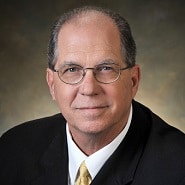
Chuck Christian, CTO & VP of Technology, Franciscan Health
At the start of the year, Franciscan Health was taking initial steps toward moving some of its services to virtual health.
However, the onset of the Covid-19 pandemic turned out to be the impetus that forced the hand of the 13-hospital system. It had to react, and quickly.
The onslaught of the pandemic accelerated the system’s move to providing virtual care services to speed patients’ access to care and keep clinicians safe. Its early preparation gave Franciscan Health a head start in facing the demands posed by the pandemic. The organization, and a technology supplier, NTT Data Services, presented an insider’s view of its rapid transition in a webinar entitled, “Franciscan Health’s Covid-19 Virtual Care Journey.”
In advance of the pandemic, Franciscan Health – which has hospitals in Indiana and Illinois, and operates about 370 other care delivery sites – had already selected a platform on which to enable virtual care visits for patients, and was working with its medical staffs to expand those care offerings, said Chuck Christian, vice president of technology and CTO for the system. The approach would give patients access to urgent or emergency care, as well as facilitate “check ins” with clinicians, via either a phone or text conversation or a full-blown virtual visit using video.
That preparation gave the system the ability to make a quick switch to virtual care as the magnitude of the pandemic began to hit, said Sri Bharadwaj, VP of digital innovation at Franciscan Health. “We had some capabilities … we had a platform and we had some plans, but what happened was this event transformed the way the organization looked at medicine,” he said.
Providers’ use of technology had to pivot quickly because of the contagious nature of Covid-19 and surging patient volume, said Mary Edwards, president of the Healthcare Provider business for NTT DATA Services. The company helped many healthcare organizations implement technology to serve expanded and temporary care sites outside the walls of facilities, and enable virtual care capabilities.

Sri Bharadwaj, VP of Digital Innovation, Franciscan Health
Christian said the move to virtual care at Franciscan Health also was facilitated by the organization’s decision early on to send employees home to work. That way, IT staff were able to help support the rapid shift to offering virtual care. “I’ve been in healthcare for a long time, and this is no different than doing surge management and trying to figure out what do you do next,” he said.
At facilities, Christian and Bharadwaj were able to extend information technology beyond hospital buildings to ambulatory settings, and freestanding tents and structures near hospitals.
Collaboration was key to the effort in adapting care delivery to virtual models. “Getting together with leadership was one of the first things we did,” Bharadwaj said. “We identified several leaders in the organization who would be our physician champions as well as operational champions. Then, we started figuring out how to help them deliver care.”
That type of collaboration is crucial in dealing with crises and implementing significant change, such as shifting to virtual health, Edwards said. Service-based leadership and the ability to manage bureaucracy are key determinants of success, she added.
Christian and Bharadwaj mobilized their teams and started working to develop several care scenarios. “We came up with innovative ideas about how to deploy a virtual care-type environment,” Bharadwaj noted. Services that typically were accomplished face-to-face, such as palliative care, were quickly transitioned to virtual.
They also made it a priority to offer options, which helped in gaining clinician support. “We allowed employees to identify options that they think will help them and find opportunities that we need to be able to support,” Bharadwaj said. “That’s what we do even today. In the olden days, prior to Covid, the process would have taken a few months – here, we did it in a day or two.”
However, it required the entire organization to mobilize, Christian said, describing a meeting on one Sunday evening, when a group of physicians and hospital leaders sought a change in how the organization provided virtual health services. After consultation with security and firewall specialists, IT moved quickly to deliver on the request.
“Rather than doing what we typically do, which is figuring out why we shouldn’t do this, we listened when our physicians said, ‘If we can do this, we can take better care of our patients,’” he added. “The mood changed to, how do we make this happen, without worrying about all the red tape? Our people worked through the evening to make it happen.”
With the technology it had in place, Franciscan was able to enable other variations on virtual care, Christian noted. He described “collaborative rounding,” which involves sending only one clinical staff member into a patient’s room, whether the patient has Covid or not. The clinician carries a tablet device, sending a stream of the encounter into a conference room, where the rest of the care team can collaborate on the patient’s care plan.
Similarly, technology was used for communal discharge planning for Covid patients, enabling collaboration among all members of the care team to craft a customized discharge plan for patients. “Most of the time, people that have Covid who were sick enough to be in the hospital have a lot of comorbidities, so you have a lot of specialists taking care of them – pulmonologists, cardiologists and typically a hospitalist,” Christian said. “Ask a nurse how difficult it is to discharge a patient like this when you have to get consensus about what the medications are and the care plan. This allows them to do this in real time – this is where the technology can have a profound impact.”
Lastly, Christian advised never letting a good crisis go to waste. “It wasn’t that we were leveraging the crisis; the crisis has changed our mindset, and we think about these problems differently – how can I engage, from a technology standpoint, with the people who are providing care so I can make their lives a little easier?”
To view the archive of this webinar — Franciscan Health’s Covid-19 Virtual Care Journey (Sponsored by NTT Data) — please click here.


Share Your Thoughts
You must be logged in to post a comment.